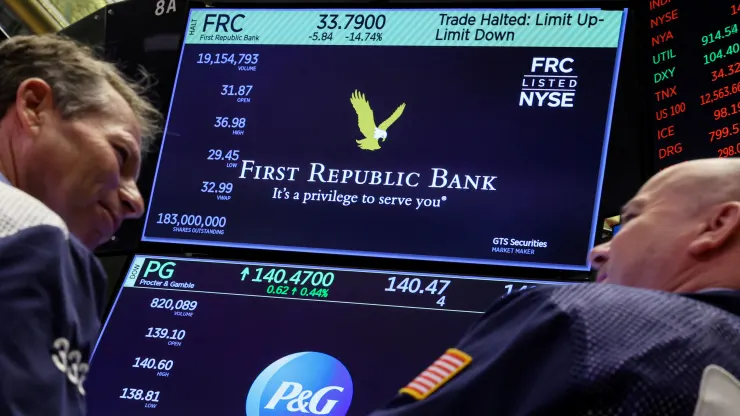Shares of First Republic reversed their losses and regional bank stocks pushed higher as 11 major U.S. banks are struck a rescue deal for the firm.
First Republic shares closed up nearly 10% after the news. The stock had been down more than 30% earlier in the day.
Elsewhere, the SPDR S&P Regional Bank ETF (KRE) rose 3.5%, while Western Alliance and Zions Bancorp. gained 14.1% and 4.6%, respectively. All three had declined earlier in the session.
The collapse of Silicon Valley Bank last Friday has left investors scrambling to identify other regional banks that have similar balance sheet issues, namely a high rate of uninsured deposits and bonds or loans with a long time to maturity.
First Republic had the third-highest rate of uninsured deposits among U.S. banks, behind SVB and Signature Bank, which was closed by regulators over the weekend, according to a note from Raymond James. First Republic’s stock was down nearly 75% in March as of Wednesday’s close, and the bank’s debt has been downgraded by S&P Global Ratings and Fitch Ratings.
The plan announced on Wednesday called for $30 billion in deposits from major banks, including JPMorgan Chase and Bank of America, as a show of confidence in the regional banking system.
The struggles for regional bank stocks early this week came despite the announcement from U.S. regulators over the weekend of additional support. That included a new program from the Federal Reserve that allowed banks to swap some assets for cash without having to realize the mark-to-market losses caused by higher interest rates.
In addition to the fears of more bank failures, the potential for increased regulation and smaller deposit bases for midsized banks could also be hurting the stocks as investors assess the future earnings power of the regionals.
The banking system got another shock Wednesday, when Credit Suisse’s Swiss-traded shares fell more than 20% amid concerns that the bank’s “material weakness” in its financial reporting could lead to it needing to raise more capital. However, the Swiss National Bank, the country’s central bank, struck a deal with Credit Suisse to allow it to borrow up to roughly $54 billion.
But while Credit Suisse’s struggles could have ripple effects throughout the global banking system, the Swiss bank’s problems appear to be unrelated to the U.S. regional banks.

